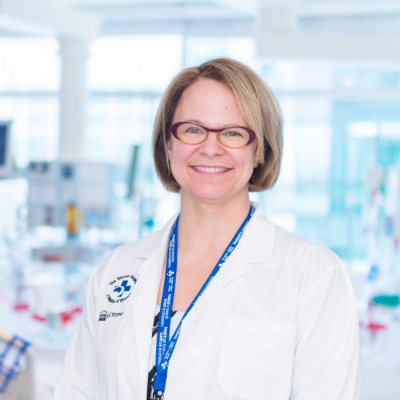 “Although we weren't able to show a significant difference between these two fluids, our study showed the power of this hospital-wide approach for comparing commonly used treatments,” says Dr. Lauralyn McIntyre.A clinical trial led by researchers at The Ottawa Hospital and the University of Ottawa and published in the New England Journal of Medicine illustrates a powerful and efficient approach for comparing different standard treatments. The FLUID trial compared two intravenous fluids that have been commonly used for decades in hospitalized patients: normal saline and Ringer's lactate. Many millions of litres of these fluids are used every year in Canada alone, and there is no strong evidence favouring one over the other across the hospital.
“Although we weren't able to show a significant difference between these two fluids, our study showed the power of this hospital-wide approach for comparing commonly used treatments,” says Dr. Lauralyn McIntyre.A clinical trial led by researchers at The Ottawa Hospital and the University of Ottawa and published in the New England Journal of Medicine illustrates a powerful and efficient approach for comparing different standard treatments. The FLUID trial compared two intravenous fluids that have been commonly used for decades in hospitalized patients: normal saline and Ringer's lactate. Many millions of litres of these fluids are used every year in Canada alone, and there is no strong evidence favouring one over the other across the hospital.
Unlike a traditional trial, which would randomly assign each patient to receive one fluid or the other, this trial randomly assigned entire hospitals to use one fluid for three months, then switch to the other fluid. Clinical data were downloaded directly from health administrative sources housed at ICES, with no individual patient recruitment required. This innovative approach allowed the team to quickly and efficiently collect data from more than 43,000 patients in seven Ontario hospitals.
While this trial established the value of this approach, the study had to be stopped early due to the pandemic and the researchers were not able to gather enough data to detect small differences in outcomes between patients who received the different fluids.
“Although we weren't able to show a significant difference between these two fluids, our study showed the power of this hospital-wide approach for comparing commonly used treatments,” says trial leader Dr. Lauralyn McIntyre, a senior scientist and critical care physician at The Ottawa Hospital and associate professor at the University of Ottawa.
The research team estimates that it costs less than $10 to enroll a single patient in their trial, whereas a traditional trial would have cost more than $1,000 per patient. “Other researchers will be able to build on this experience to design similar trials to efficiently answer important questions for patients and our health-care system,” says Dr. Monica Taljaard.
“Other researchers will be able to build on this experience to design similar trials to efficiently answer important questions for patients and our health-care system,” says Dr. Monica Taljaard.
The Ottawa Hospital’s Ottawa Methods Centre played a key role in designing this “cluster-randomized trial,” with Dr. Monica Taljaard as the lead methodologist.
“Other researchers will be able to build on this experience to design similar trials to efficiently answer important questions for patients and our health-care system,” says Dr. Taljaard, senior scientist at The Ottawa Hospital and professor at the University of Ottawa.
For Dr. McIntyre, the trial also illustrated how everyone in a hospital could come together to support research, including facilities, logistical services, nurses and allied health professions, physicians, trainees and research services.
“I can’t thank our hospital staff and all the other participating hospitals enough for making this research possible,” she says.
This trial was approved by the Ottawa Health Science Network Research Ethics Board. Funding was provided by the Canadian Institutes of Health Research and The Ottawa Hospital Academic Medical Organization (TOHAMO). The Ottawa Hospital Research Institute sponsored the study and the Canadian Critical Care Trials Group helped with coordination. Tracy McArdle was the FLUID trial manager.
Full reference: A Crossover Trial of Hospital-Wide Lactated Ringer’s Solution versus Normal Saline. New England Journal of Medicine. Published June 12, 2025. Lauralyn McIntyre, M.D., Dean Fergusson, Ph.D., Tracy McArdle, B.Sc.N., Shane English, M.D., Deborah J. Cook, M.D., Alison E. Fox-Robichaud, M.D., Claudio Martin, M.D., John Marshall, M.D., Michael Pugliese, M.Sc., Kusum Menon, M.D., Kednapa Thavorn, Ph.D., Ian D. Graham, Ph.D., Steven Hawken, Ph.D., Akshai Iyengar, M.D., Kwadwo Kyeremanteng, M.D., Raphael Saginur, M.D., Andrew J.E. Seely, M.D., Ian G. Stiell, M.D., Daniel Bainbridge, M.D., Charles Weijer, M.D., and Monica Taljaard, Ph.D., for the Canadian Critical Care Trials Group.
Core resources: Ottawa Methods Centre, ICES
The Ottawa Hospital (TOH) is one of Canada’s top learning and research hospitals where we are guided by our vision to provide the world-class and compassionate care we would all want for our loved ones. Our multi-campus hospital, affiliated with the University of Ottawa, is home to the Regional Trauma Centre and Cancer Centre, and to discoveries that are adopted globally. Backed by generous support from the community, we are focused on reshaping the future of health care to improve the health of our diverse population of patients from Eastern Ontario, Western Quebec, and Nunavut. For more information, visit?ohri.ca.
The University of Ottawa is home to over 50,000 students, faculty and staff, who live, work and study in both French and English. Our campus is a crossroads of cultures and ideas, where bold minds come together to inspire game-changing ideas. We are one of Canada’s top 10 research universities—our professors and researchers explore new approaches to today’s challenges. One of a handful of Canadian universities ranked among the top 200 in the world, we attract exceptional thinkers and welcome diverse perspectives from across the globe. www.uottawa.ca
Media contacts
Jennifer Ganton
Director, Communications and Public Relations,
613-614-5253
jganton@ohri.ca
